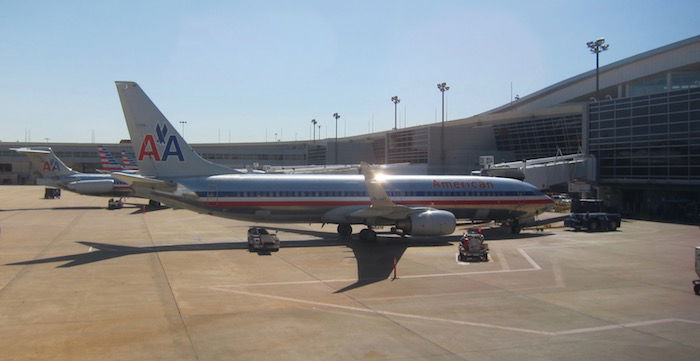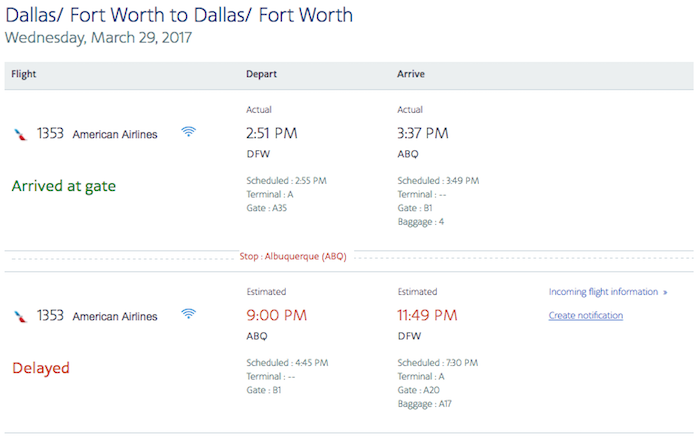Well this is sad, and extremely rare. CNN is reporting that an American Airlines 737-800 first officer died earlier today just minutes before the flight he was at the controls of was scheduled to land.

This incident occurred on a flight from Dallas to Albuquerque, AA1353, at around 3:30PM. Two miles from landing the captain declared an emergency due to a “medical issue,” and it was later revealed that this was because the first officer passed away at the controls. Upon landing the plane taxied to the gate, and then CPR was apparently performed on the first officer for 35-40 minutes before he was pronounced dead.
The outbound flight from Albuquerque to Dallas ended up being delayed by several hours. I imagine the pilots were supposed to work that flight back, and American had to get a new crew.

What a sad story — my thoughts are with the pilot and his family and friends.
Situations like this are extremely rare, though not unheard of. In 2015 an American captain died at the controls flying from Phoenix to Boston, causing the flight to divert to Syracuse.
What makes this situation especially unusual, however, is that it seems it occurred just minutes before landing. Presumably an emergency would have been declared much earlier if the incident had occurred earlier in the flight, so it truly seems like this happened just minutes before landing.
While one pilot can easily perform all the tasks needed to land under normal conditions, the captain still deserves kudos for the quick and safe landing. Duties aside, I can’t imagine the shock of finding that the person next to you has suddenly died, while still having the concentration to do your job properly.





Thank you American Airlines. Good thing it wasn't EVA Air then they would have blamed it on an air traffic controller in San Diego trying to make an honest living .
The AED doesn't detect a pulse, it detects a shockable rhythm. So the protocol should be start effective chest compressions immediately (push hard and fast) and get the AED from the medical kit (it's shrink wrapped with plastic if present) and put it on the victim without interrupting CPR. It was likely his only chance, and it's not possible to know in retrospect. But... Minutes count--it's been well established that shocks work way better when...
The AED doesn't detect a pulse, it detects a shockable rhythm. So the protocol should be start effective chest compressions immediately (push hard and fast) and get the AED from the medical kit (it's shrink wrapped with plastic if present) and put it on the victim without interrupting CPR. It was likely his only chance, and it's not possible to know in retrospect. But... Minutes count--it's been well established that shocks work way better when delivered quickly. I wonder how long appropriate care was delayed because they didn't/couldn't get him out of the cockpit and start treatment. Wondered the same about Carrie Fisher. Would a crew let a medical person out of their seat on approach to render life saving, time critical treatment? Although it will never be known, I can't help but wonder if the outcome could have been improved if the pilot would have delayed landing so the AED could have been used immediately and safely by folks on board allowed to leave their seats. Not judging here, just thinking "out loud." All planes should have AEDs for this very scenario.
My thoughts and prayers are with the pilot's family and friends... but what a way to go!
I want thank the captain and cabin crew who managed to keep their focus and composure and safely land the aircraft. THIS is where the value of professional, trained staff makes all the difference. Not sure if AA has AEDs onboard, but AEDs only go so far. If there's no pulse, the AED will not fire. The AED...
My thoughts and prayers are with the pilot's family and friends... but what a way to go!
I want thank the captain and cabin crew who managed to keep their focus and composure and safely land the aircraft. THIS is where the value of professional, trained staff makes all the difference. Not sure if AA has AEDs onboard, but AEDs only go so far. If there's no pulse, the AED will not fire. The AED has to see some sort of heart rhythm for it to allow a shock to be delivered. Even then, the success rate is low. As far as taxiing to the gate, I have a feeling that the captain wasn't following company policy regarding speed limits and taxiways. ATC & Ground would have cleared everyone out of his way so he could get in quickly. I'm not going to second-guess any of their actions. I wasn't there, and I'm sure we're not getting all of the facts, and I'll trust their judgement.
This is also a reminder why the flight deck should have no fewer than 2 pilots onboard. Boeing and RyanAir have been pushing to reduce this down to a 1-pilot cockpit, but these situations show why that is a mistake.
Without knowing the details we can only presume that the captain did the following two things:
1. Try to work in a horribly difficult situation next to his dead colleague and safely land the plane whilst setting aside the shock, etc, of the episide, and follow procedure as best he could [bearing in mind that whilst he clearly did an incredible job at remaining stable and set aside the trauma of the situation, there's no...
Without knowing the details we can only presume that the captain did the following two things:
1. Try to work in a horribly difficult situation next to his dead colleague and safely land the plane whilst setting aside the shock, etc, of the episide, and follow procedure as best he could [bearing in mind that whilst he clearly did an incredible job at remaining stable and set aside the trauma of the situation, there's no way it didn't impact him].
2. Communicate with control that there was a medical emergency (and that it was the pilot) and have full array of medical assistance ready in the way that is most appropriate whether at airport fire station or at the stand, or at the edge of the runway, prioritising THAT assistance in the shortest amount of time, rather than schedule, revenue, connections, etc.
I agree with @pete @mike @T and @Callum who all take a different angle on the same thing, an air bridge is definitely a faster way to get someone who is unconscious off a plane than a stairs if it can be set up in a similar timespan, and there would be AEDs etc in the terminal as well as at a remote location, plus sometimes in an emergency, such as a road traffic accident, the most critical thing can be to clear the road to prevent further accidents - it's not just to prevent inconvenience - if a plane is in an unexpected place, it's at greater risk.
Very sad though, thoughts and prayers with his family.
If the plane was really on short final when the problem occurred, it probably would have taken *way* longer to scramble a set of air stairs or whatever to the runway than to just taxi directly to the gate… and it's not exactly a great idea to take an unconscious person down the evacuation slide.
Without more information, give the pilot the benefit of the doubt.
Im sure that the reporting is just wrong (not you Lucky, but your source)... as far as im aware all crew are trained in CPR... im sure they didnt land the plane before starting CPR... surely a couple crew members will have started immediately up until they got to the gate?
Well i'd hope so anyway
@Randal - Good point.
They should have had the flight attendants working on him with cpr and the aed during the landing and had an ambulance waiting with an airplane stairs at a point off the runway without needing to taxi. This seems like very incompetent management by the captain pilot and AA.
CPR has a very low chance of success in the best of cases. That is why they use AED's. Even if they had started CPR immediately or had an AED, chances are still well below 50%, especially since this probably isn't an electrical shock victim. The medic in me wants to know cause of death, but i don't think it really matters. RIP
"Might as well die doing what you love."
But not while risking the lives of others!
I've often contemplated that my death might very well be while I'm driving at high speeds on a winding mountain pass, completely in the thrill of the moment of handling a nice muscle car, and then losing it to crash into a barrier. However, I would be alone in the car, and I wouldn't have hit anyone on the...
"Might as well die doing what you love."
But not while risking the lives of others!
I've often contemplated that my death might very well be while I'm driving at high speeds on a winding mountain pass, completely in the thrill of the moment of handling a nice muscle car, and then losing it to crash into a barrier. However, I would be alone in the car, and I wouldn't have hit anyone on the way to the guardrail.
To have a pilot die while helping to fly a plane is an entirely different story.
I don't care how many planes it would have held up (unless they'd then have to declare their own emergencies of course), taxiing all the way to the gate before attempting CPR seems wrong. At the very least a cabin crew member could have come in as soon as they landed and started it - 2 minutes could be the difference between life and death.
Maybe I'm putting too much faith in the accuracy of the paraphrasing though!
I agree with Lukas. I wouldn't want to die being hooked up to all kinds of tubes in a hospital bed, Would you? Either way, our time will come. Might as well die doing what you love.
@James I say it's the best way to go - doing what you love.
Not a great way to go. RIP Pilot